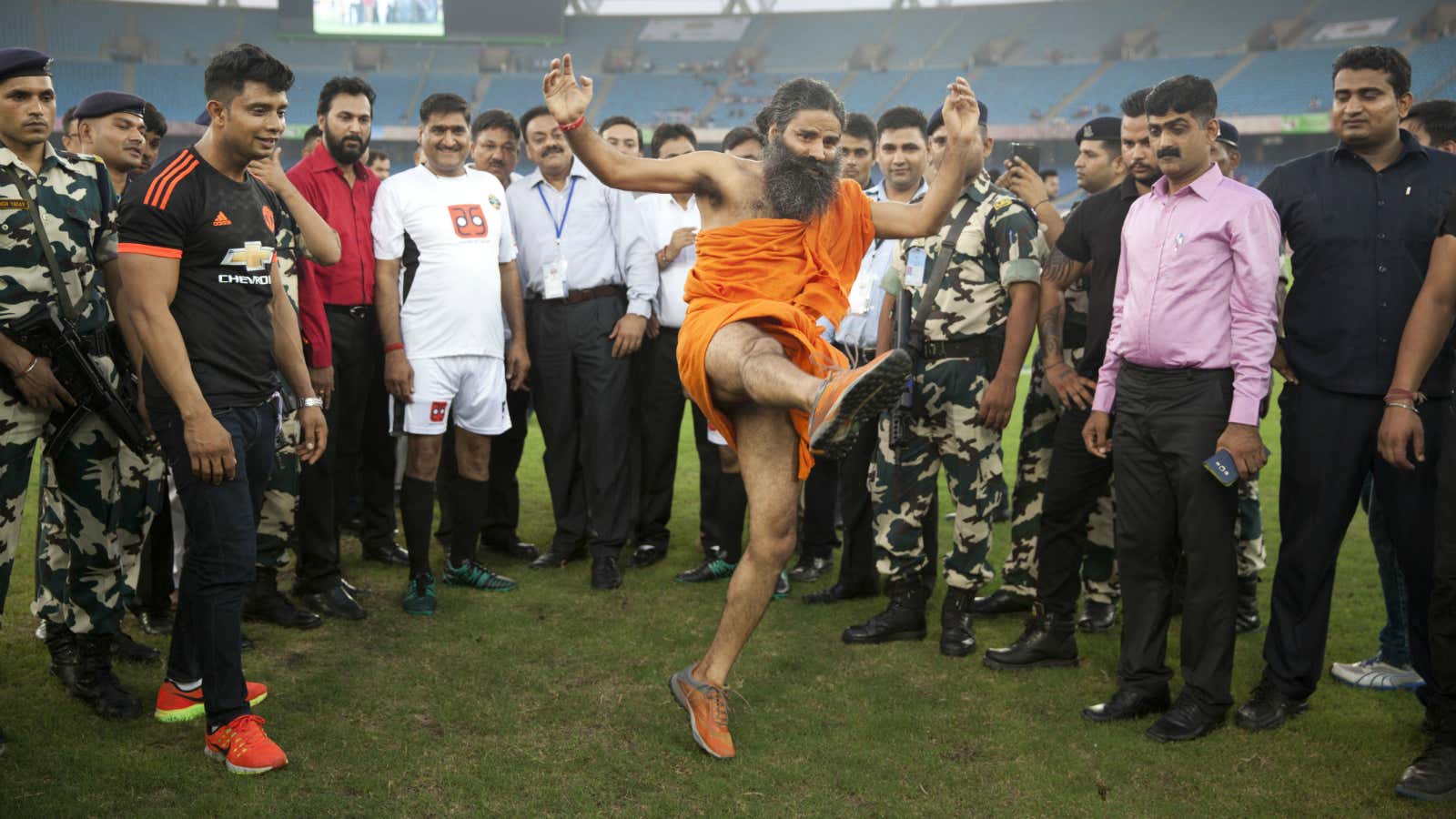India’s most famous yoga guru-turned-businessman is building an army of security guards.
On July 12, fifty-one-year-old Ramdev, whose Patanjali Ayurved has taken on India’s reigning consumer business giants, announced the launch of Parakram Suraksha (Valour Security) which will supply guards and provide security services. The company says it has recruited former Indian Army personnel and police officers to train youngsters.
“This security agency will work to evoke the nationalist spirit in every citizen and create an atmosphere of healthy physique and psychological competency among the country’s youth,” Patanjali said in a statement on July 10.
But why exactly is the saffron-robed holy man, close to prime minister Narendra Modi’s government, foraying into an industry dominated by small regional players and a few big ones?
“Maybe the baba feels the need for protecting his own assets,” Kunwar Vikram Singh, chairman of Central Association of Private Security Industry (CAPSI), said. “There is a huge need for private security…particularly to protect infrastructure, women, homes, and airports. Of course, the opportunity is massive.”
Lucrative private security
Over the past few decades, as India’s economy has grown rapidly, there has been a rise in demand for security arrangements for industrial complexes, offices, IT parks, and other public infrastructure, such as airports, metro stations, shopping malls, and public utilities.
Some of the most vital private, commercial, and non-commercial installations in the country are protected by the central government’s paramilitary forces such as the Central Industrial Security Force, the Border Security Force, and the Railway Protection Force. However, evidently this falls short. Much of that is because of the shortage of manpower, funds, and training facilities.
“The government will never be able to meet all the security needs in the country,” Rahul Kapoor, a partner at consultancy firm Grant Thornton, said. “So, they look to outsource many of the work to private companies and that is what makes the sector quite lucrative.” According to the Indian government (pdf), private security means “security provided by a person, other than a public servant, to protect or guard people or property or both and includes provision of armoured car service.” “The government contracts are long term and financially viable. Already private companies play a role at airports, metros, and other places of national importance,” Kapoor said.
At an annual growth rate of over 20%, private security is one of India’s fastest-growing sectors, employing nearly seven million people across the country. By 2020, it is expected to be worth a staggering Rs80,000 crore—double its current value—and employ five million more, Grant Thornton says (pdf). Highly fragmented and dominated by small players, the industry’s few big names are the UK-based G4S, New Delhi-based Security and Intelligence Services, and Stockholm-based Securitas.
Currently, providing personnel as guards is its largest segment and involves services such as providing logistics for ATM refiling and electronic security systems such as CCTV.
“There are some 200 smart cities coming up in India, and we will need at least one million smart security force for that. With massive infrastructure growth, private security is a huge growth area,” added Vikram Singh. “Across the world, too, there is a shortage of skilled security men, and that also provides opportunities for Indians to work abroad.”
The National Skill Development Corporation, a government body, has joined hands with CAPSI to set up the Security Sector Skill Development Council (SSSDC), which trains security personnel at several “centres of excellence” across the country.
Why Ramdev?
Patanjali, on its part, has been charting an ambitious path. It has set a target of Rs20,000 crore in turnover by the next fiscal (2017-2018), double the figure for 2016-17, adding more categories such as baby care and dairy products and drawing plans to go global. The company’s been eyeing education, apparel, and even the restaurants business. So foraying into the lucrative private security is not surprising.
So how will the company fare?
“Patanjali is an entity known to be associated with ayurveda, and all things natural. It is really respected for that at least in the FMCG space,” said Harish Bijoor, a brand-building consultant based in Bengaluru. Bijoor added that as long as there is a separate company for the security business it augurs well. “It will do really well as long as they don’t mess it up with Patanjali brand-name because that resonates with a consumer-focussed business.”
But it may not be an easy task. “The future of private security space is shifting towards digital and artificial intelligence-operated systems,” added Kapoor of Grant Thornton. “While human intervention is needed, the nature of the job is moving towards motion sensing, command centres, and camera-operated tools which means augmenting the human jobs with digital tools.”
Perhaps, Ramdev has all that figured out, too. After all, nobody needs to teach this holy man how to do business.
